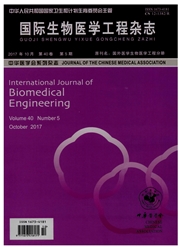

 中文摘要:
中文摘要:
目的研究快速老化对记忆脑区海马CA1神经元电活动兴奋性的影响。方法应用脑片和细胞外记录技术,记录快速老化(sAM.P/8)组和正常对照组小鼠在海马脑片CA1区的锥体神经元自发放电序列,通过计算2组神经元自发放电频率和神经元放电间隔(ISI)研究快速老化对海马CA1区神经元兴奋性的影响。结果快速老化组小鼠海马CA1区神经元自发放电频率为(1.052±0.364)Hz(样本数n1=14),正常对照组为4.416+1.306Hz(样本数n1=22),前者比后者显著降低(P〈0.05);快速老化组ISI≥1s,占80.5%,正常对照组ISI均≤1S,其中95.6%≤0.5S,前者比后者显著延长。结论快速老化组小鼠海马脑片CA1区神经元的发放频率降低,ISI延长。提示快速老化对小鼠海马区神经元兴奋性电活动起到了明显的抑制作用。
 英文摘要:
英文摘要:
Objective To investigate the effect of fast-aging on the excitability of hippocampus CA1 neurons in mouse and the possible interaction between fast-aging and hippocampus. Methods Using brain slice and extraeellular recording technique to record the firing of hippocampus CA 1 neurons in fast-aging(SAM-P/8) and normal control mice, after preprocessing, neural firing train were obtained. Using neural firing rate and inter- spike-inter to investigate interaction between fast-aging and hippocampal neural firing. Results The neural firing rate of hippocampus CAI neurons in fast-aging mice is (1.052_+0.364) Hz(n=14), while the neural firing rate in normal control mice is (4.416±1.306) Hz(n=22). In fast-aging mice, 80.5% inter spike intervel(ISI) is longer than lsec, but in normal control mice, 95.6% ISI is shorter than 0.Ssee. Conclusion The decreased firing rate of hippocampus CA1 and longer ISI observed in the fast-aging mice indicates that fast-aging significantly inhibit hippocampal CA1 neurons excitability.
 同期刊论文项目
同期刊论文项目
 同项目期刊论文
同项目期刊论文
 期刊信息
期刊信息
